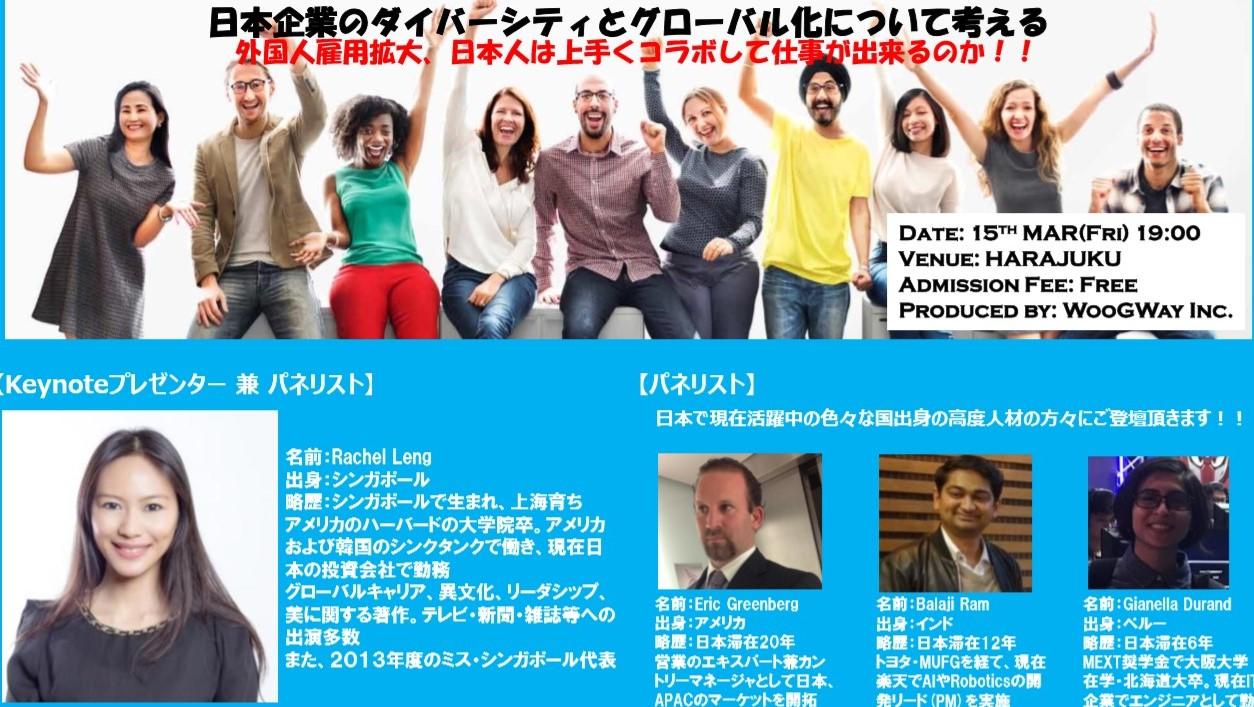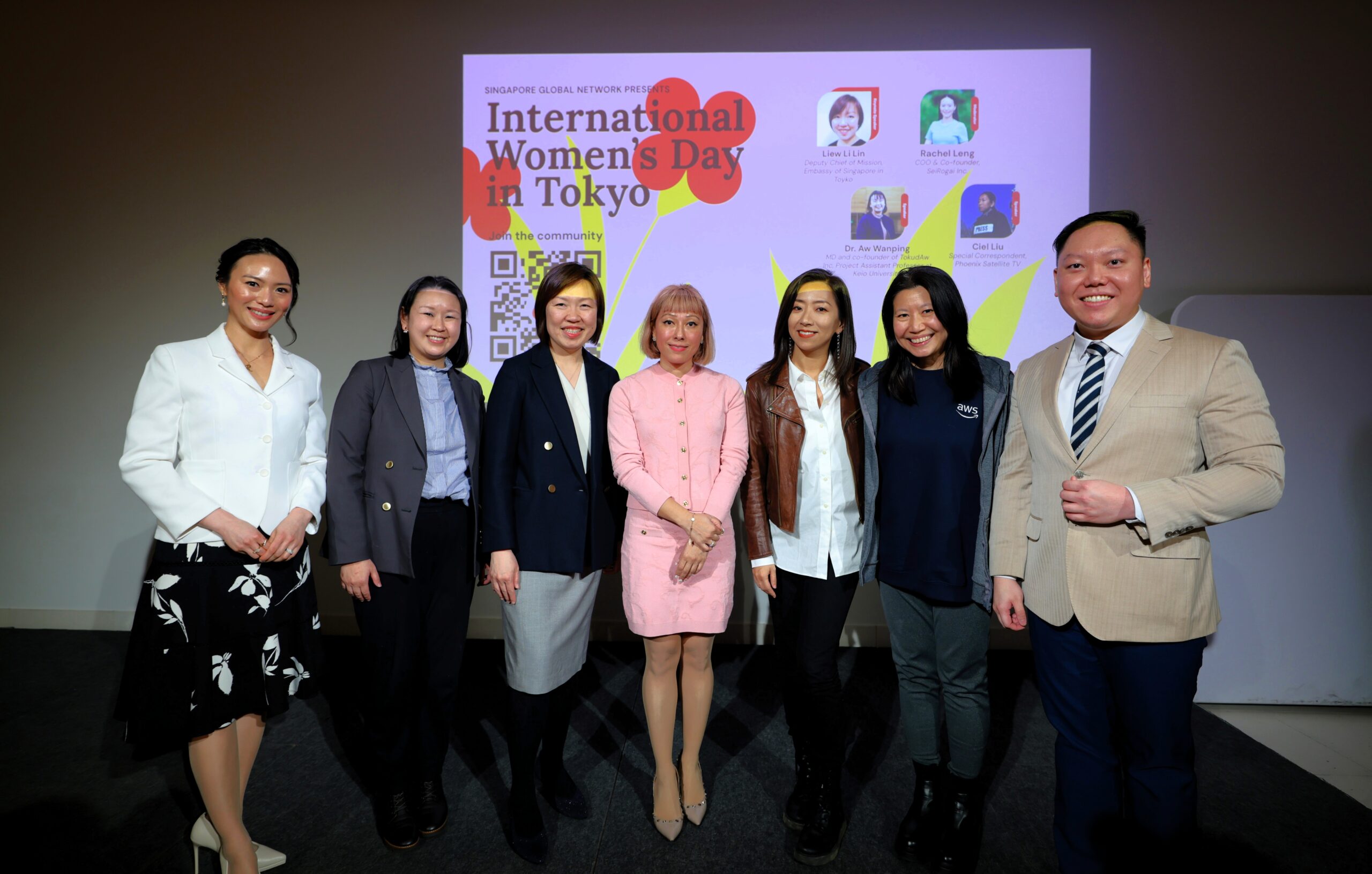Recently, I participated in WooGWay Inc.’s seminar as speaker and panelist sharing my perspective on working in Japan as a foreigner. My presentation was on the topic of how Japanese companies can better appeal to foreign talent and shared some tips on effective cross-cultural communication.
最近、日本企業がどのように優能な外国人にアピールすることができるかについての私の見解と効果的な異文化間コミュニケーションについてのいくつかのアドバイスをシェアする講演を行いました。このセミナーは(株)WooGWay主催で開催されます。そして、私はKeynoteプレゼンター及び専門パネリストとして参加しました~!
Read on for a summary of my talk at WooGWay’s seminar event!
WooGWayのセミナーイベントでの講演の概要については、以下をご覧ください。
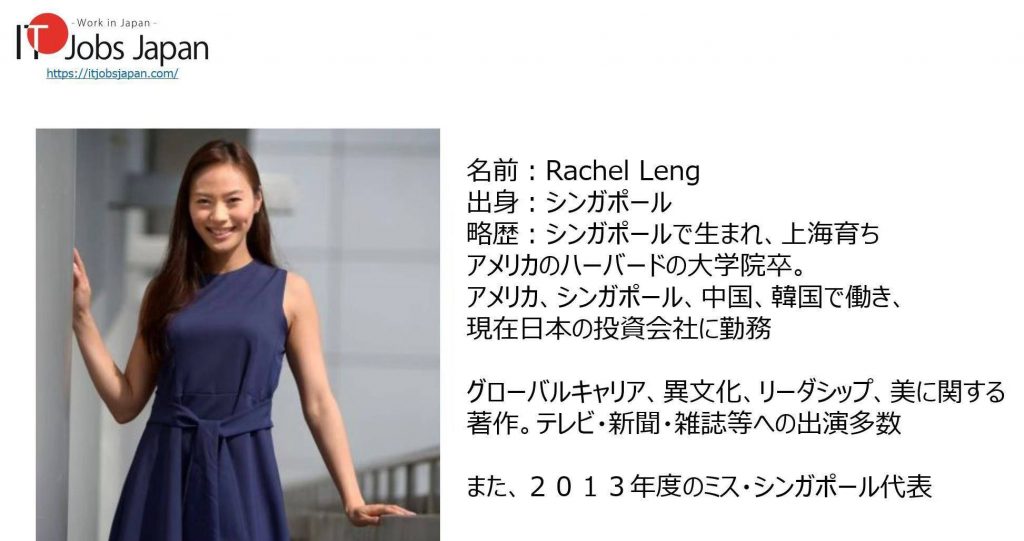
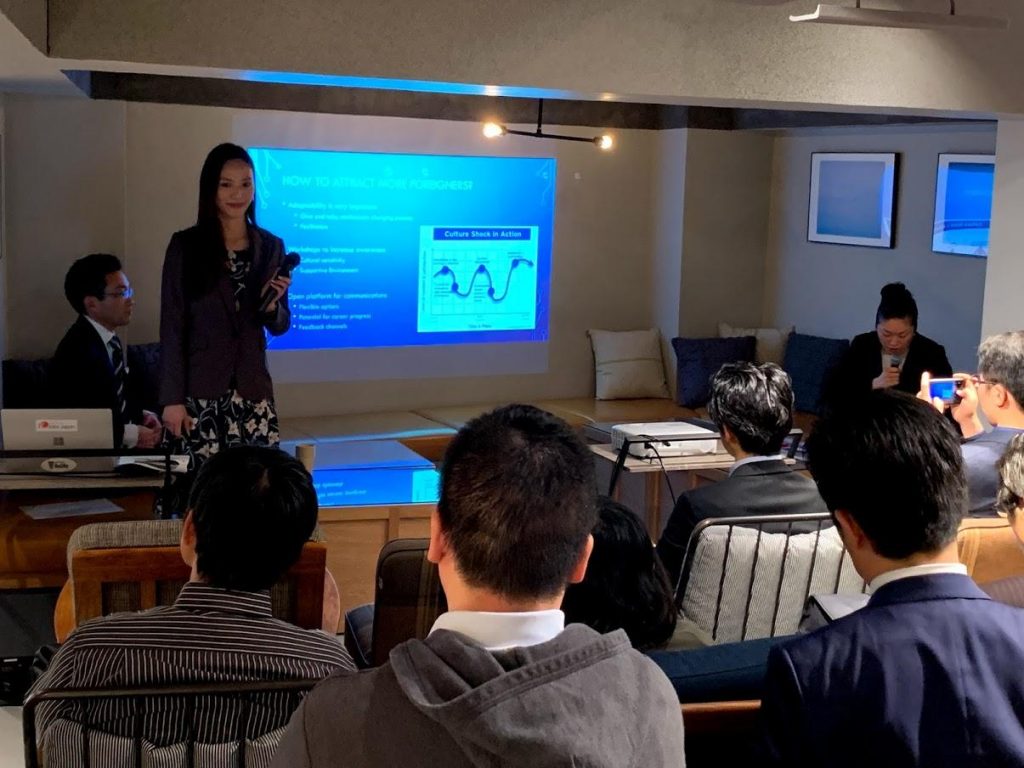
*~*~*~*
Background on Japan’s Immigration Law Change
日本の移民法変更の背景
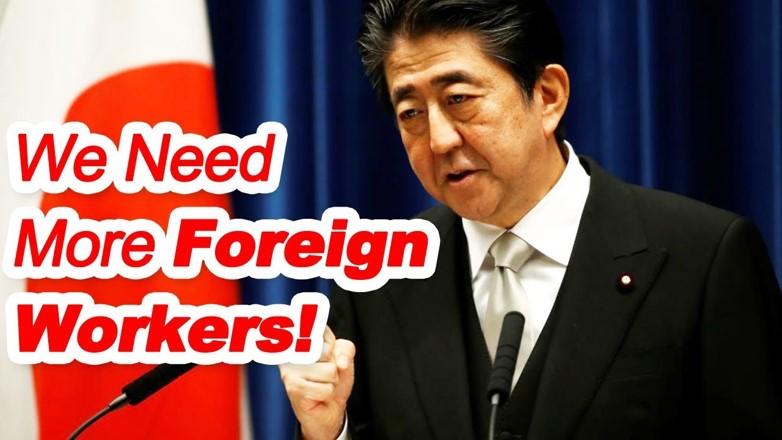
Japan is the third largest economy in the world, but also the most rapidly aging and facing a critical labor shortage. To support a dwindling workforce, the Japanese government is introducing amendments to the Immigration Act that allows for more foreigners to work in Japan. These amendments (including the introduction of a new visa category) have become effective from April 1, 2019.
日本は世界第3位の経済大国ですが、最も急速に高齢化し、深刻な労働力不足に直面しています。 減少する労働力を支援するために、日本政府はより多くの外国人が日本で働くことを可能にする移民法の改正を導入しています。 これらの改正(新しいビザカテゴリーの導入を含む)は、2019年4月1日から有効になりました。
How can Japanese companies take the right approach to hiring more skilled employees from outside of Japan? What are foreigners looking for when they come to Japan, and how can Japanese companies work successfully with foreigners?
日本企業は海外からより熟練した従業員を雇用するためにどのようにして正しいアプローチをとるのでしょうか? 外国人は日本に来るとき何を求めていますか、そして日本企業はどのようにして外国人とうまく仕事をしていくのでしょうか?どのようにしてコミュニケーションを取っていくのでしょうか?
そのような高度人材を招き、日本企業で活躍してもらうには、何が必要なのか、また彼ら日本で働いている外国人は日本の企業で何を感じているのでしょうか?
Event Information || イベント情報について
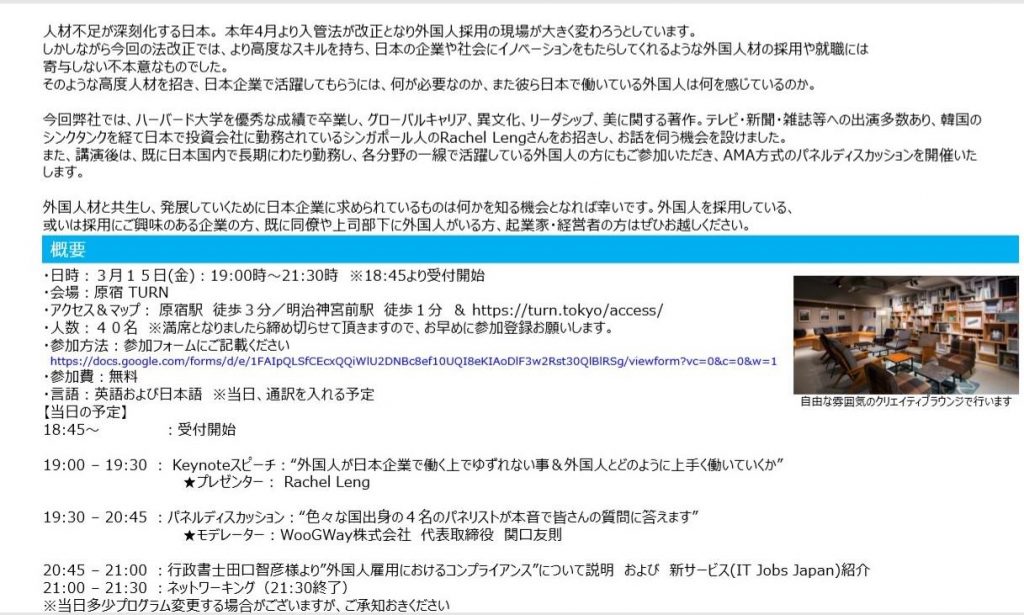
Other Panelists || 他のパネリストについて
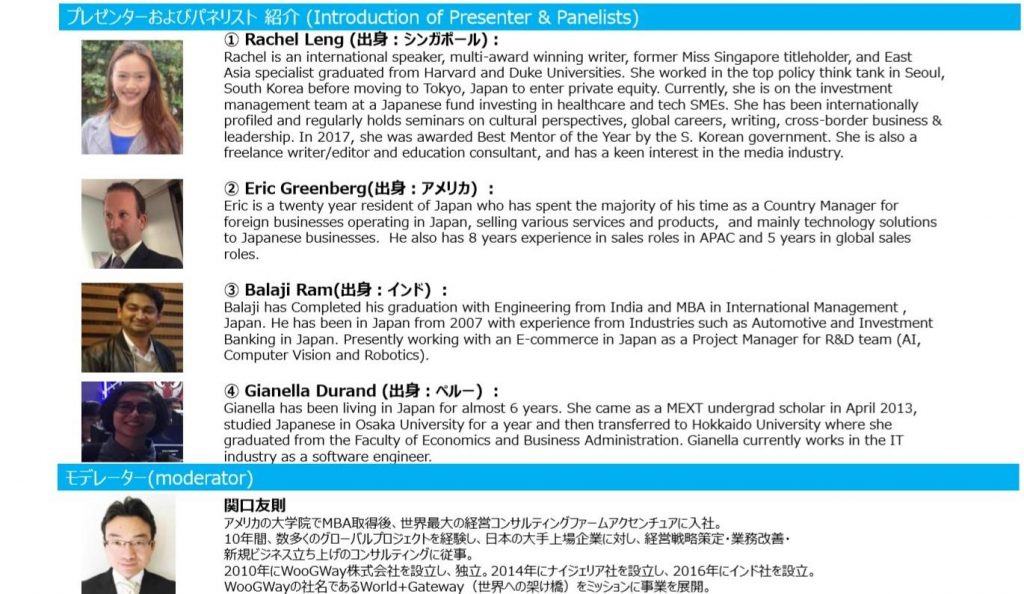
Key Points from my Talk:
私のスピーチのキーポイント:
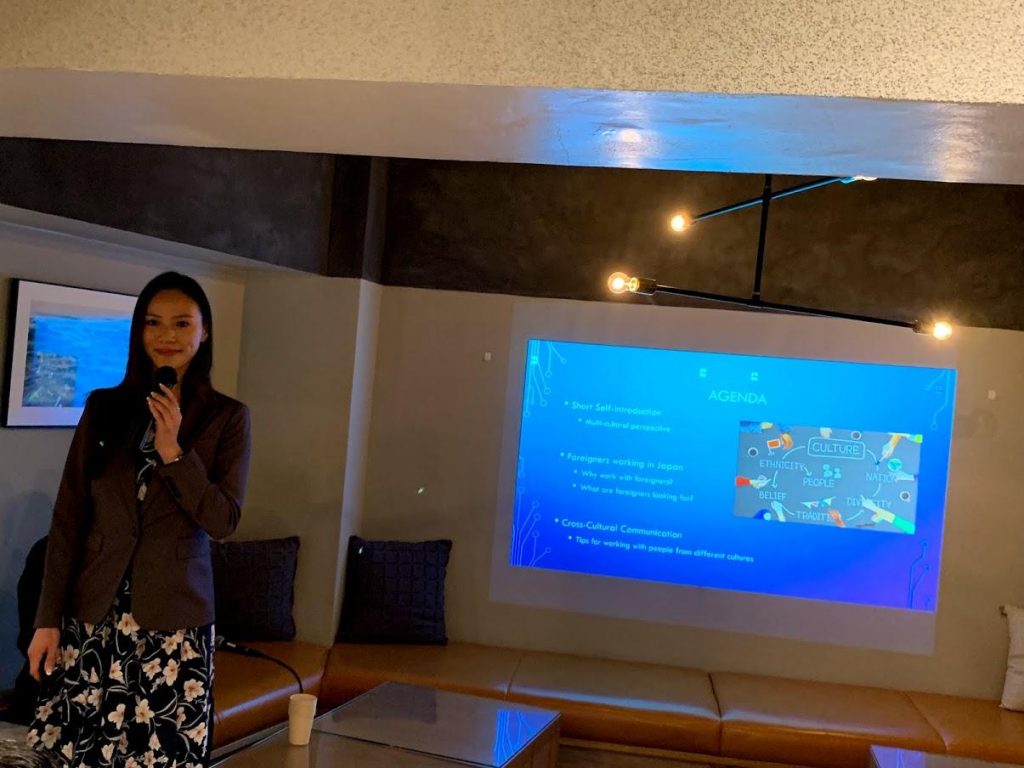
*~*~*~*
Why Should Japanese Companies Work with Foreigners?
なぜ外国人と一緒に働きますか?
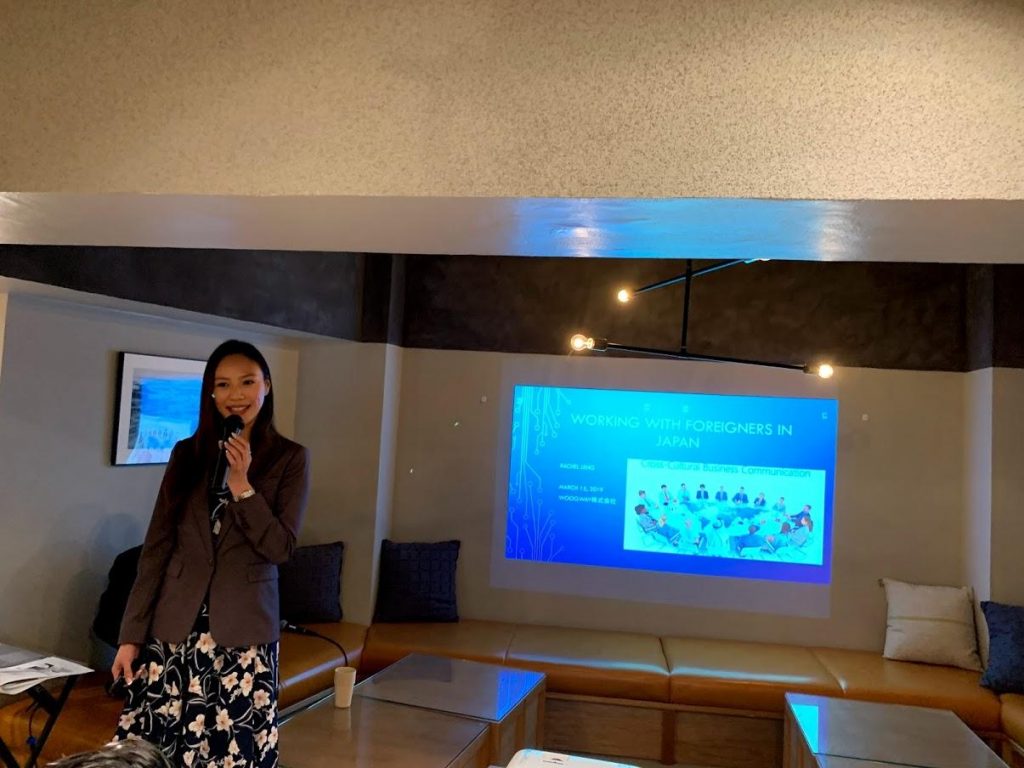
The impression of Japanese companies is that they are generally conservative and homogenous. Although Japan has been very successful in the past and maintains the third largest economy, it is necessary for Japanese companies to hire more foreign works to remain competitive globally. Cultural diversity is necessary for innovation, globalization, effective marketing and advertising, international competitiveness, and more successful business outcomes.
外国人にとって、日本企業の印象は、彼らは一般的に保守的で均一であるということです。 日本は過去に大成功を収め、第3位の経済大国を維持していますが、日本企業が世界的に競争力を維持するためには、より多くの外国人の労働力を採用する必要があります。 文化の多様性は、革新、グローバリゼーション、効果的なマーケティングと広告、国際競争力、そして良いビジネス成果に必要です。
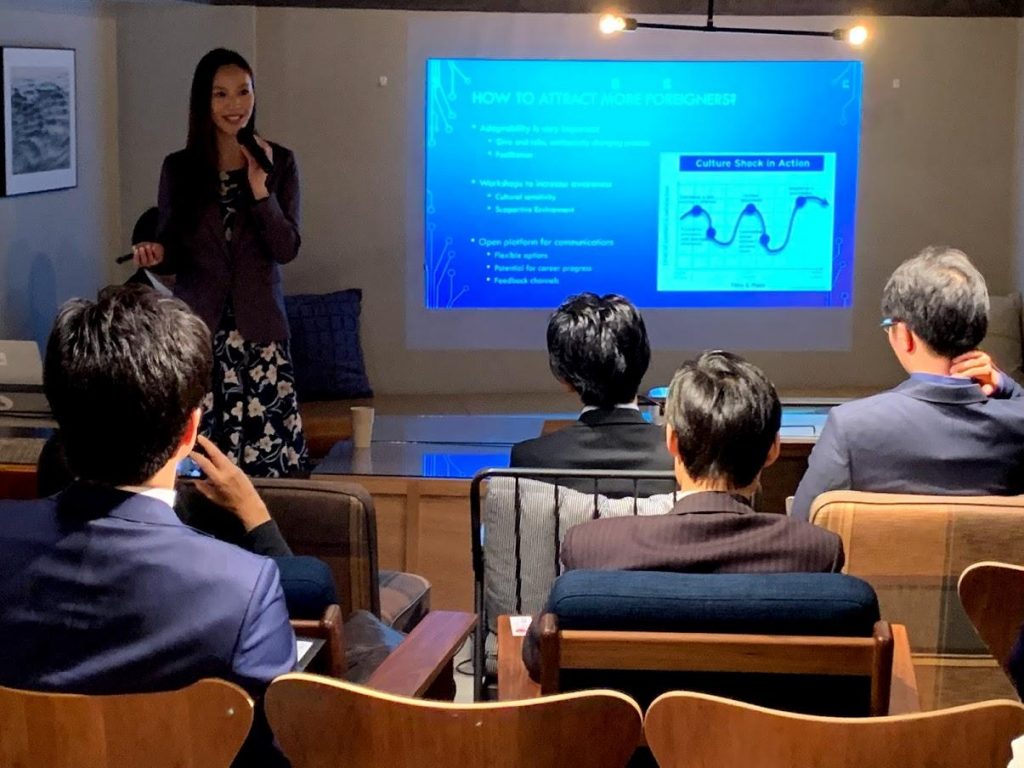
*~*~*~*
What are foreigners looking for?
外国人は日本企業で何を求めていますか?
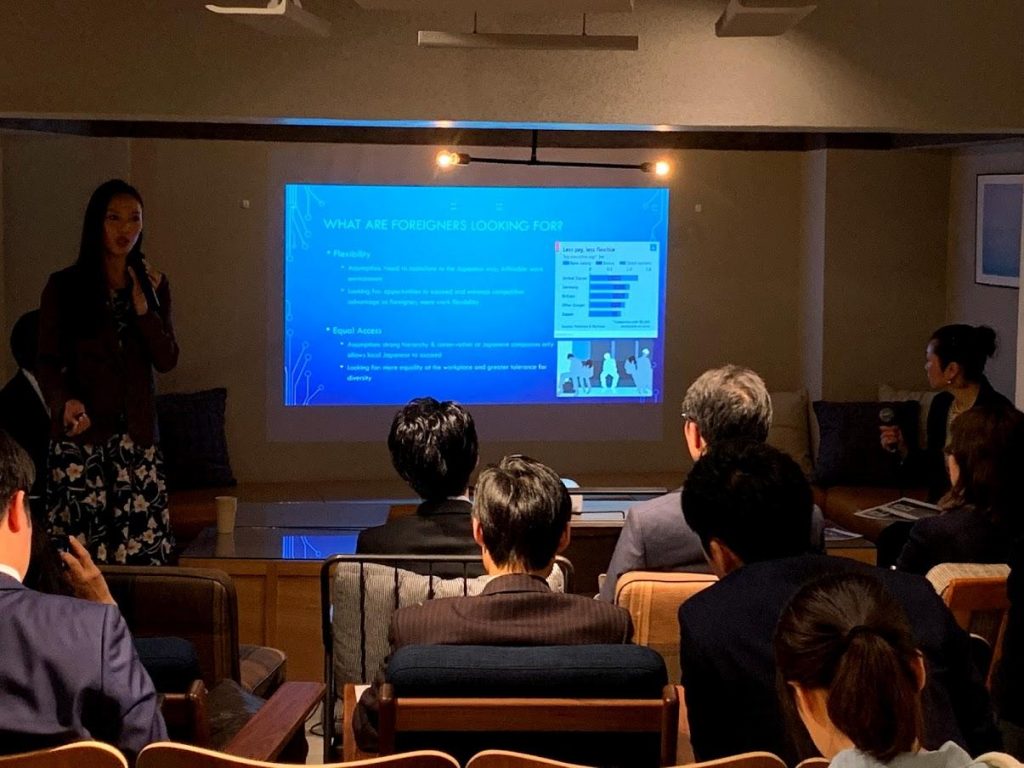
- Work/Life Balance
• Assumption: Japanese work too much overtime (残業) and homogenous social pressure leaves little personal time. Media criticism of karoshi (過労死, death from overwork) also paints negative image of Japanese work environment.
• Looking for: ways to balance work and personal time; fair compensation for work
1) 仕事と生活のバランス
•前提として:日本では残業が多くなり過ぎ、仕事のプレッシャーの個性がなくなり、個人的な時間がほとんどなくなります。過労死に対する国際メディアの批判は、日本の労働環境に対する否定的なイメージを描いています。
•外国人が求めるもの:仕事と私生活のバランスをとる方法。 仕事の時間に対する公正な補償

2. Economic and Career Growth
• Assumption: Japanese companies have stagnant growth and are inefficient
• Looking for: greater challenges and opportunities for efficiency, growth
2)経済的な発展とキャリアの成長
•前提として:日本企業は成長が停滞し、非効率的である
•外国人が求めるもの:経済的な発展の効率、各自のキャリアの成長のための挑戦と機会
3. Flexibility
• Assumption: Need to assimilate to the Japanese way; inflexible work environment
• Looking for: opportunities to succeed and enhance competitive advantage as foreigner; more work flexibility
3)柔軟性
•前提として:日本の労働習慣に同化する必要がある。 柔軟性のない職場環境
•外国人が求めるもの:外国人として成功し競争優位性を高める機会。 より柔軟な作業
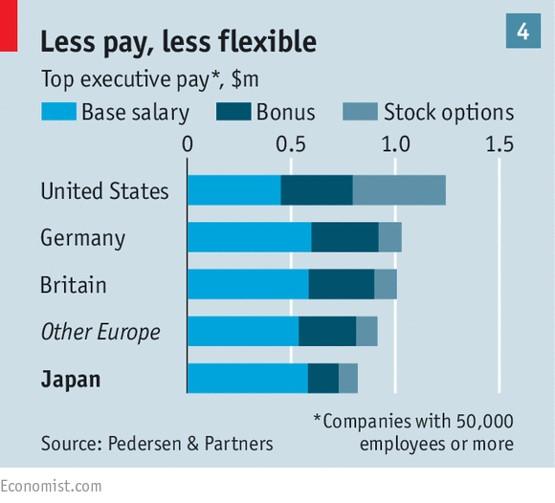
4. Equal Access
• Assumption: strong hierarchy & conservatism at Japanese companies only allows local Japanese to succeed
• Looking for: more equality at the workplace and greater tolerance for diversity
4)平等なアクセス
•前提として:日本企業の年功序列性と保守主義は、現地の日本人しか理解できないし、そして、企業では日本人しか昇進できない。
•外国人が求めるもの:職場での平等性と多様性に対する寛容性の向上

*~*~*~*
How can Japanese companies attract more foreigners?
日本企業はどのようにしてより多くの外国人を招くことができますか?

There is a need for Japanese companies to adapt to foreign cultures and value skilled talent from outside of Japan, enabling them to best contribute at the workplace. This will be a continuously changing process. Companies can host more workshops to increase awareness about cross-cultural communications. In particular, cultural sensitivity and a supportive environment when foreign workers may be experiencing culture shock and adjusting to a new workplace is critical to retaining skilled talent. Establishing an open platform for communication between foreigners and Japanese is also key: it is very important that foreigners can understand their options and potential for career progress, as well as have feedback channels to voice their perspective. Having someone with the ability to facilitate these communications (e.g.: multi-cultural and bilingual individuals) will be a valuable asset.
日本企業も外国の文化と相互に適応し、日本以外からの優秀な外国人達を大切にしたうえで、彼らが職場で最も貢献できるようにする必要があります。 これは絶えず変化するプロセスです。 異文化間コミュニケーションについての認識を高めるために、企業はより多くのワークショップを開催することが必要です。 特に、外国人労働者が日本に来る時、カルチャーショックを経験し、新しい職場に適応する場合の文化的な相違による反応、それに関係するサポート、優秀な外国人たちの労働力を維持するために重要です。外国人と日本人とのコミュニケーションのためのオープンプラットフォームを確立することもとても大切なことです。外国人が彼らの見解を表明するためのフィードバックチャネルを持つことと同様に、外国人が彼らの選択肢とキャリアアップの可能性を理解することは非常に重要です。 これらのコミュニケーションを円滑にする能力を持つ人(例:多文化およびバイリンガルの人々)を持つことは貴重な資産となります。
*~*~*~*
Conclusion and Recommendations
結論と推奨
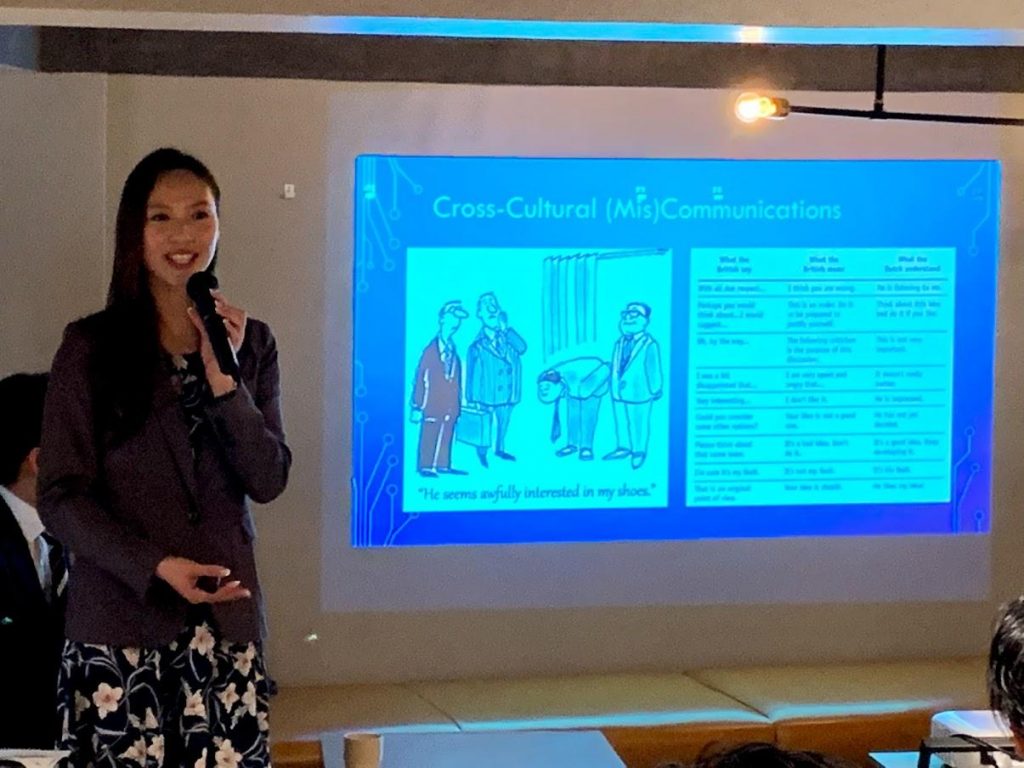
• People without cross-cultural training are twice as likely to fail in international environments (but, 98% successful with training – easily addressed and achieved!)
• Cross-cultural communication is a challenging, but exciting development in today’s business world bringing many opportunities!
• There are countless differences between cultures – impossible to create rules for every situation.
- Modify communication styles according to recipient’s culture and perspective in mind: high context cultures (good communication is intuitive and nuanced) vs. low context cultures (good communication is explicit and simple).
• Mutual Respect & Etiquette is important: “When in Rome do as the Romans do”
•異文化間トレーニングを受けていない人は、国際的な環境で失敗する可能性が倍になります(ただし、98%がトレーニングをうけて成功しています –>つまり、トレーニングをうけると種々問題を簡単に対処できます)。
•異文化間コミュニケーションは、今日のビジネス界では画期的なことであり、多くの機会をもたらします。
•文化間には数え切れないほどの相違点があります – あらゆる状況に対してすべて当てはまるルールを作成することは不可能です。
•相方の文化や視点に応じてコミュニケーションスタイルを変更する:高コンテキスト文化(相手の環境、状況より、地震の考えを明確に話す)と低コンテキスト文化(相手の環境、状況に合わせて話す)。
•相互尊重と礼儀(マナー)は重要です。「郷に入っては郷に従え」
| Most important skill is to be able to recognize, respect, and understand differences***最も重要なスキルは、相互の違いを認識し、尊重し、 理解することができることです |
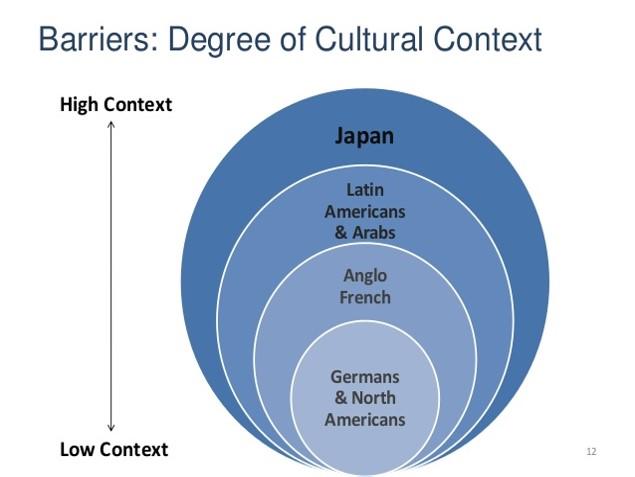
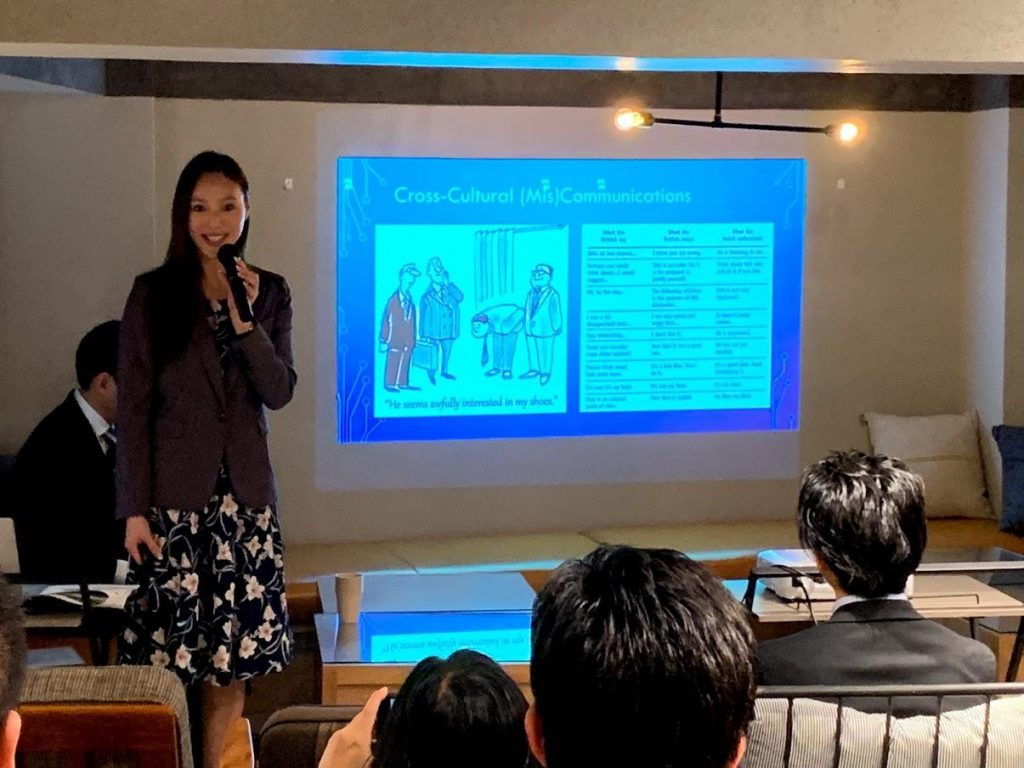
Further Reading:
The Culture Map: Breaking Through the Invisible Boundaries of Global Business by Erin Meyer.
“An international business expert helps you understand and navigate cultural differences in this insightful and practical guide, perfect for both your work and personal life.”
*~*~*
About WooGWay, Inc.
株式会社WooGWayについて

The company name, WooGWay, combines “World” and “Gateway”. It represents our corporate philosophy to become Japan’s gateway to the world and help Japanese companies to break into the global market, leading to the success of the customer. Since March 2019, we have established “IT Jobs Japan” to introduce talented IT engineers from abroad to Japanese companies. WooGWay aims to create opportunities for Japanese companies to diversity and innovate. WooGWay(ウーグウェイ)という社名は「World」と「Gateway」を組み合わせ造語です。 当社の企業理念の根底ともなる社名には、日本企業および日本人が国内のみならず世界でも称賛され、輝く存在となるために、我々が“架け橋となる”という決意が込められています。 日本企業が世界の市場に進出するのを支援し、成功へ導く事をミッションとしております。その一環で”IT Jobs Japan”という外国人の優秀なITエンジニアを日本企業に紹介するという 新サービスを3月に立ち上げ、日本企業にDiversity とInnovation創出機会を作り出そうとしています。

